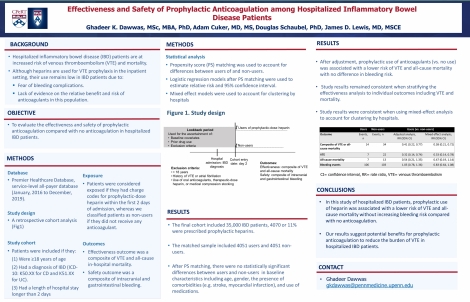Ghadeer Dawwas
Effectiveness and Safety of Prophylactic-Dose Heparin for Thromboprophylaxis in Hospitalized Inflammatory Bowel Disease Patients

Presenter
Flash Talk Presenter
Ghadeer Dawwas, PhD, MSc, MBA is a postdoctoral fellow in the Department of Epidemiology, Biostatistics and informatics at the Perelman School of Medicine of the University of Pennsylvania. Dr. Dawwas’s research focuses on the comparative effectiveness and safety of medical products in selected patients’ populations who were often excluded or underrepresented in randomized clinical trials.
Abstract
Background
Hospitalized inflammatory bowel disease (IBD) patients are at increased risk of venous thromboembolism (VTE) and mortality.
Objective
To evaluate the effectiveness and safety of prophylactic-dose heparin compared with no anticoagulation in hospitalized IBD patients.
Methods
This was a retrospective cohort study using a hospital-based, all-payer database from Premiere Healthcare, which reflects 25% of all inpatient encounters in the U.S. We included adult patients with IBD who had a length of hospital stay ≥ 2 days from January 1, 2016, through December 31, 2019. We excluded patients who had other indications for anticoagulation (e.g., VTE, atrial fibrillation, mechanical heart valve), users of oral anticoagulants, and users of heparin at therapeutic-dose. The primary effectiveness outcome was a composite of VTE and all-cause in-hospital mortality. The primary safety outcome was a composite of intracranial bleeding and gastrointestinal bleeding. We used propensity score matching to reduce potential differences between users and non-users. We estimated relative risk (RR) and 95% confidence interval (CI) using logistic regression models.
Results
The analysis included 8,840 IBD patients (n=4,420 for users and n=4,420 for non-users). The composite of in-hospital mortality and VTE occurred in 14 (0.3%) users and 46 (1.0%) non-users. In the adjusted analysis, prophylactic use of anticoagulants (vs. no use) was associated with a lower risk of VTE and all-cause mortality (RR, 0.33, 95% CI 0.18 to 0.61) with no difference in bleeding risk (RR, 0.85, 0.66 to 1.10). The results for the effectiveness and safety outcome remained consistent for VTE (RR, 0.26, 0.11 to 0.59) and all-cause mortality (RR, 0.43, 0.18 to 1.06).
Conclusions
In this comparative effectiveness and safety study of hospitalized IBD patients, prophylactic heparin was associated with a lower risk of VTE and all-cause mortality without increasing bleeding risk compared with no anticoagulation. Our results suggest potential benefits for prophylactic anticoagulation to reduce the burden of VTE in hospitalized IBD patients.
Keywords
Apixaban, warfarin, anticoagulants, heparin, venous thromboembolism, inflammatory bowel disease, pharmacoepidemiology, gastroenterologyAbout Us
To understand health and disease today, we need new thinking and novel science —the kind we create when multiple disciplines work together from the ground up. That is why this department has put forward a bold vision in population-health science: a single academic home for biostatistics, epidemiology and informatics.
© 2023 Trustees of the University of Pennsylvania. All rights reserved.. | Disclaimer


Comments